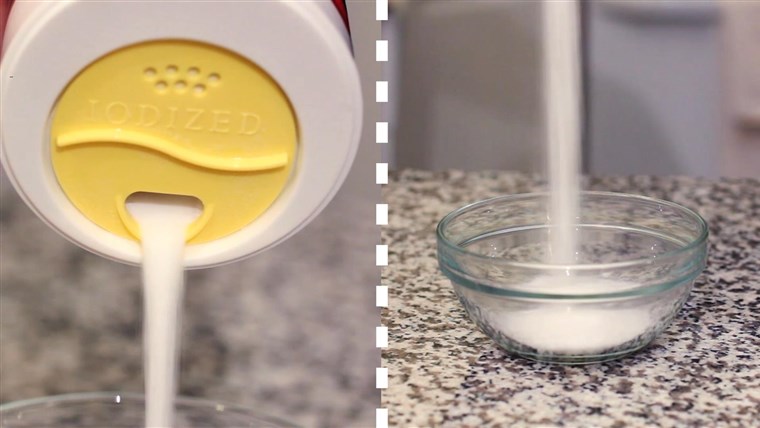Michelle Emebo still remembers the number on the scale a month after she gave birth to her daughter: 225 pounds
“I’ve never weighed that much in my life,” Emebo, 35, who lives in Tinley Park, Illinois, told TODAY. “I gained a lot of weight when I was pregnant.”
More concerning, her blood pressure — which had always been in the normal range — began entering the hypertension stage at 135/90 in the weeks before she went into labor. Emebo had no symptoms, but the readings at her doctor’s office kept coming back high and stayed there after her pregnancy.
At 5 feet 9 inches tall, the new mom was now considered obese and hypertensive. She was also suffering from postpartum depression and found she could not shake the heaviness — both mental and physical.
“Once I had my daughter, the things I was doing before to keep my weight under control just weren’t working. I think that’s just part of a woman figuring her body out after having her baby because you’re sleep deprived and other things going on,” Emebo said.
“That was when I realized I needed help.”
Almost 60% of Black women have high blood pressure and less than half of them have it under control, according to the American Heart Association, where Emebo is a “Real Woman” volunteer for the Go Red for Women campaign. Both her parents were diagnosed with high blood pressure and survived strokes.
Emebo began taking blood pressure medication, but when her doctor wanted to increase the dosage after a year-and-a-half, she decided to focus on her nutrition and fitness to “course correct” without needing to take more medicine.
First stop: a meeting with a nutritionist who told Emebo to cut out all added salt and processed foods from her diet.
Emebo then tried out a class at a gym, “got my butt kicked” and signed up for a membership that day.
Five years after first being alarmed by her hypertension and the number on the scale, she now weighs 155 pounds and no longer needs blood pressure medication.
Emebo has been frequently checking her blood pressure since the start of the pandemic because the uncertainty made her feel more anxious, but she’s happy to report her readings are in good standing.
Here’s Emebo’s advice for losing weight:
Before she started making changes, Emebo and her husband were eating out or ordering in a lot. “We were not eating healthy,” she said. “I just stopped eating out because it’s so hard to control what’s in the food.”
She tried to limit her diet to 1,500-1,700 calories a day at the beginning, then boosted it to 2,200 calories when she began strength training. She recently decreased her caloric intake by about 100 calories a day because she was not doing heavy weight training during the quarantine.
Double up on your vegetables
Emebo began paying attention to portion sizes, keeping a close watch on her intake of protein and carbs, and focusing on eating more nutrient-packed veggies.
“I would always have a huge portion of kale plus maybe some carrots or squash, but I always had two servings of vegetables. That was the biggest thing,” she said. “After two or three weeks of that, I just felt different.”
Change your snacking habits
Emebo used to snack a lot, but mostly stopped on the advice of her nutritionist. If she does want to have a bite to eat between meals, she has some fruit or cut-up cucumbers and carrots with hummus.
She doesn’t skip meals, however and said she wouldn’t consider intermittent fasting a good long-term option for her.
Stick to your diet, but give yourself grace
“We don’t realize how much food is a part of life — every gathering we go to and at work. It was always somebody’s birthday or there were cookies. I had to just not eat it and it was hard,” Emebo recalled.
“Keeping focused on staying healthy is the thing that motivates me… (but) yes, I do have cravings. Sometimes, I just give in.”
If she indulges, she makes sure to get back on track the next day.
Limit or eliminate alcohol
Emebo used to drink wine with dinner and didn’t feel good afterwards, which sometimes kept her from being motivated to exercise the next morning.
When she took part in Dry January in 2018, she liked it so much that she has kept going. Now, she only drinks alcohol for her birthday or if she’s at a wedding — just celebratory occasions.
Incorporate a mix of exercise
Before the pandemic closed many health clubs, Emebo worked out five to six times a week at her gym with a mix of cardio and weights. Her routine included two days of strength training, two days of high intensity interval training, one day of core training and a day of active recovery like yoga flow.
She and her husband have also invested in home gym equipment, and Emebo takes her daughter on 5K nature runs on the weekends to get a change in scenery.
“I feel great. The biggest thing for me was just feeling like I could take control of my health,” she said.
“Sometimes, you feel like there’s nothing you can do and the moment I felt like I could make changes to really course correct with my weight and my health, it just made me feel empowered. Now I feel like I can do anything. My daughter calls me a superhero.”







